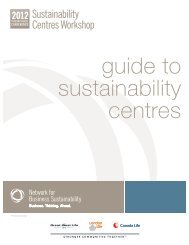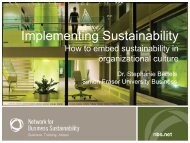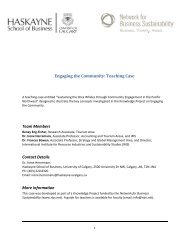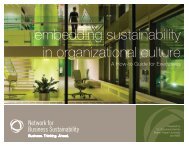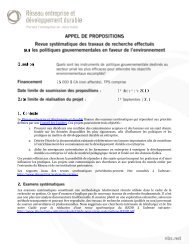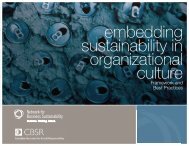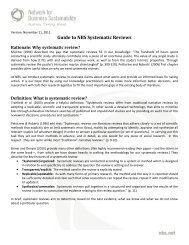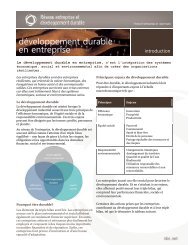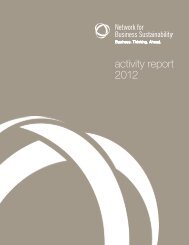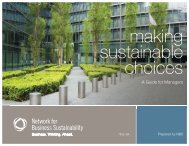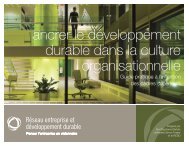Systematic Review - Network for Business Sustainability
Systematic Review - Network for Business Sustainability
Systematic Review - Network for Business Sustainability
Create successful ePaper yourself
Turn your PDF publications into a flip-book with our unique Google optimized e-Paper software.
We began our review with articles from the early<br />
1990s, 3 when <strong>Sustainability</strong>-Oriented Innovation<br />
(SOI) was thought of principally in terms of firms’<br />
environmental impacts and their technological<br />
solutions. Solutions were then regarded by many<br />
managers as an additional cost to the firm. The<br />
dominant strategic orientation was reactive;<br />
implementing environmentally related innovations was<br />
seen as a necessary response to regulatory obligations.<br />
The traditional argument that polluting firms are<br />
competitively disadvantaged by the obligation to<br />
reduce their emissions has been countered by Porter<br />
and Van Der Linde (1995) among others. They argued<br />
that firms can benefit from first-mover advantages,<br />
economic efficiencies and reputational enhancement.<br />
That is, adoption of an environmental orientation can<br />
contribute to, not detract from, a firm’s competitive<br />
advantage.<br />
Twenty years later, the tenor of the literature reflects<br />
an evolved perspective: many firms are increasingly<br />
proactive, innovating in the domain of sustainability <strong>for</strong><br />
reasons of both compliance and competitiveness. They<br />
are also motivated by a wider systems/common futures<br />
perspective that adopts more responsible positions in<br />
terms of the social and environmental impacts of their<br />
business activity.<br />
Contemporary firms are experimenting with novel<br />
practices that extend the idea of sustainable business<br />
beyond eco-efficiency to fully integrate sustainability<br />
thinking as a core business driver and into all aspects<br />
3 Our review focuses on the period from from 1992 (marked by the Rio Summit) to 2012.<br />
of their operations and relationships. Firms are <strong>for</strong>ming<br />
new collaborations, embedding themselves in local<br />
and global communities and experimenting with new<br />
business models and with new models of innovation,<br />
such as frugal innovation, resource-constrained<br />
innovation, reverse innovation and jugaad innovation.<br />
SOI AND TRADITIONAL INNOVATION<br />
Our findings suggest that SOI and traditional innovation<br />
have much in common. Both address technological<br />
change and innovations in processes, in operating<br />
procedures and practices, in business models and in<br />
systems thinking. Because of these commonalities,<br />
firms with existing innovation capability are well<br />
positioned to become sustainably-oriented innovators.<br />
Their already-developed innovation capability is an<br />
important antecedent of their capability <strong>for</strong> SOI.<br />
Similarly, firms should be able to easily integrate<br />
sustainability dimensions into any already adopted<br />
quality systems such as Six Sigma or ISO 9000.<br />
In the context of Operational Optimization, the first<br />
and typically incremental SOI stage, innovation <strong>for</strong><br />
SOI may not be a radically different phenomenon<br />
from a firm’s previous innovation activities. Many<br />
sustainable innovations, particularly those related to the<br />
environment, are not radical — they reinvent the wheel.<br />
They do what existing technologies already do, but in a<br />
more ecologically efficient manner. Further, the values<br />
that underpin conventional innovation also underpin<br />
SOI in this context: added value or cost reduction<br />
and, ultimately, either increased revenues from existing<br />
Innovating <strong>for</strong> <strong>Sustainability</strong> 12



